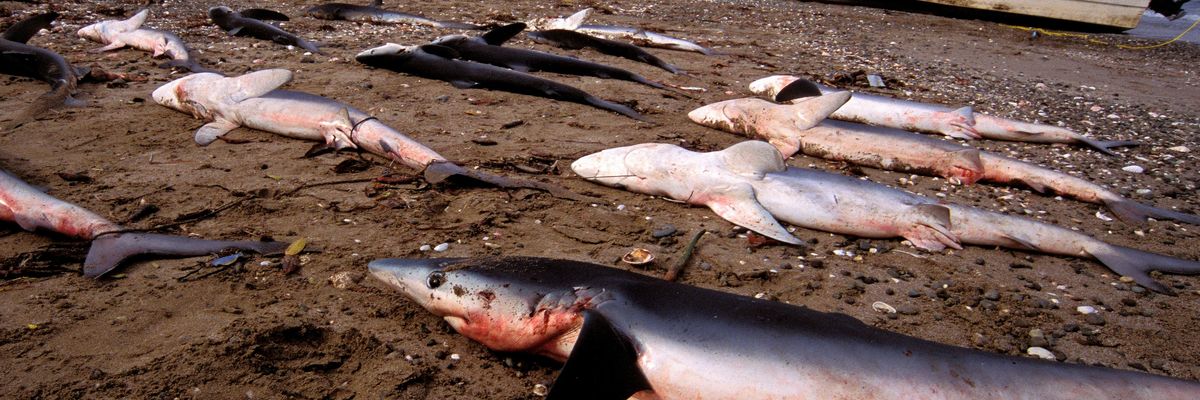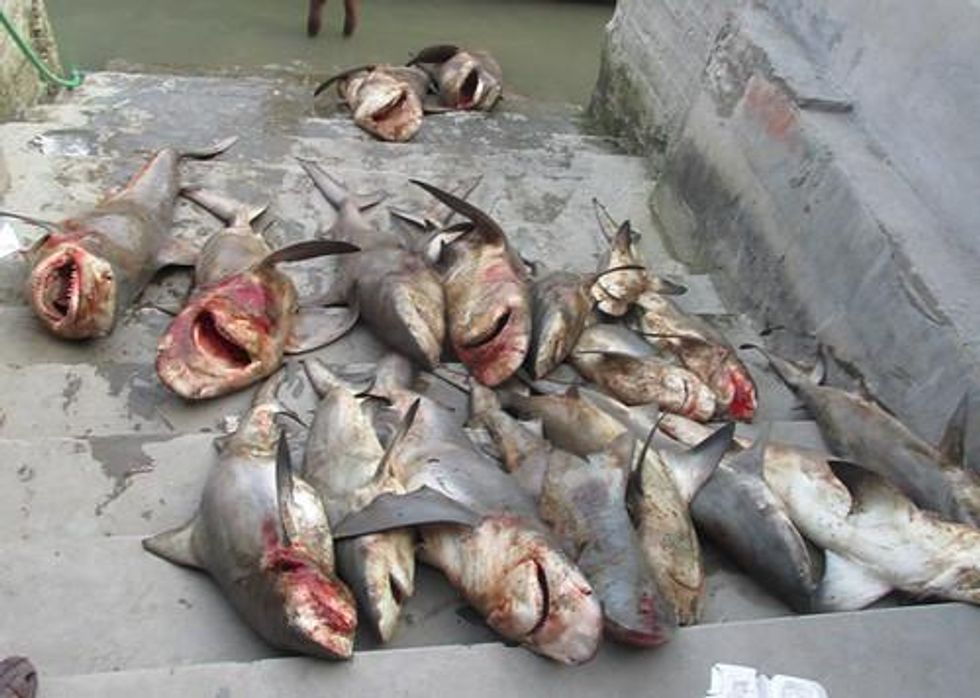Duunnn dunnn... duuuunnnn duun... duuunnnnnnnn dun dun dun dun dun dun dun dun dun dun dunnnnnnnnnnn dunnnn. This is one of the most recognizable theme songs in Hollywood history and the movie Jaws has clouded our judgement of sharks since its release in 1975. Spielberg portrays sharks as dangerously vengeful, yet statistics tell a completely different story.
In 2018, the Hong Kong Shark Foundation reported that over 100 million sharks were being killed each year for the multi-billion-dollar shark fin industry.
In 2020, in total, there were 129 cases of shark attacks on humans. Thirty-nine of these attacks were provoked, meaning humans initiated the interaction in shark habitat, so less than 100 were malicious. Of these 'malicious' attacks, six were attacks on boats, three were doubtfully carried out by sharks, one was in a public aquarium, and one was on a person who was already dead. While some may contend that this is a large enough number to warrant the mass culling of sharks, let's take a look at how many of these attacks resulted in death. The answer is ten. Therefore, if we were to take the conservative number of sharks killed by humans each year of 200 million and divide that by the number of humans killed by sharks, we arrive at a figure of twenty million. For every fatal shark attack on humans, humans exterminate twenty million sharks. In 2019, the number of fatalities was just two. To put this into context, two people were killed by cows while out for a walk in the U.K. in 2020. This does not seem to be a fair fight, and as this is Shark Week, maybe we need to reappraise our relationship with these predators from our ancestral home.
In 2018, the Hong Kong Shark Foundation reported that over 100 million sharks were being killed each year for the multi-billion-dollar shark fin industry. Hong Kong is at the center of this barbaric trade with around half of all fins passing through its ports on their way to the soup bowl. A staggering 85% of Hong Kong restaurants continue to offer shark fin on their menus and at just over $920 for 1.3 lb (600g) of fin, the industry is extremely profitable. Around seventy-six different species of shark end up in dinner bowls in Hong Kong, but while it may seem easy to point the finger of blame at China, it is worth noting that over 100 countries are complicit in this oceanic savagery. China has also witnessed an 80% drop in demand since 2011 after a long conservation campaign.
Japan is another Asian country with a large finning industry. In the town of Kesennuma, on a single day, seventy-five tons of blue shark, ten tons of salmon shark and three tons of short fin mako were on show. This trade occurs six days a week all year round. Other Asian countries including Taiwan, Macau, Thailand, Vietnam and Indonesia also have flourishing fin markets. Fishers as far away as Wales are now profiting from these senseless killings.

"White Cheek Shark Slaughtered for the Illegal Shark Fin Trade" (Photo: USFWS Headquarters/ CC PDM 1.0)
While it may be easy for some to blame Asia for the sorry state of sharks in our oceans, the truth is that between 100-273 million sharks killed by humans are killed unintentionally by the fishing industry. Sharks caught illegally have they bodies thrown overboard while often their fins head to port. That is, the largest cause of shark declines is not the Asian shark fin soup customer, but the regular fish consumer. Bycatch is the term used for the sea life removed from the ocean by accident while targeting a specific species. This is the most common cause of shark declines, accounting for 66.9% of shark species reported by the International Union for Conservation of Nature (IUCN) to be facing conservation threats. Indeed, sharks are the biggest victims of bycatch. Due to the opaque nature of the fishing industry's bycatch, accurate numbers of sharks caught are difficult to find and many areas of the planet carry out little research. What is known is that large industrial fishing operations and smaller artisanal fishers are both complicit. The largest bycatch comes from longlines, deep-sea and coastal trawl fisheries.
The future of humans and sharks are intertwined, but our indifference to their suffering could have severe consequences for the survival of both species.
In the Pacific Ocean, around 3.3 million sharks are caught as bycatch on long lines intended for tuna and other large fish, while in the northeast Atlantic Ocean, bycatch has reduced hammerhead populations by 89% and thresher and white sharks by 80%. Around the island of Madagascar, foreign fishing vessels take around 4,300 tons of shark each year with a further 3,800 ending up on locally owned boats. Indonesia is a key player in the overfishing of sharks with over 100,000 tons being dragged from their oceans every year. Around 15% of this amount is due to bycatch from the tuna industry. Canada and the United States also perform well in the unintentional killing of sharks' league with between 71,000 and 93,000 tons of blue shark being caught on long lines intended for swordfish between 2000 and 2006. In the southern hemisphere, the small nation of New Zealand punches above its weight with 2,700 tons of shark being caught by the tuna industry. South Africa reports its bycatch by individuals killed and between 1995-2005, between 39,000 and 45,000 sharks were killed as bycatch each and every year. The list goes on and on. The fishing industry in every nation is contributing to the destruction of sharks through wasteful practices and most bycatch is not declared so the numbers quoted above are certain to be hugely underestimated.
In total, 62% of shark species are facing major conservation threats and due to their late maturity and few offspring, unless fish consumption starts to decrease very soon, they face a very bleak future. There are many who would like to see the end of sharks, but such undeveloped thinking could have disastrous consequences.
As apex predators, sharks are crucial in the maintenance of oceanic ecosystems. As an example, in areas without the presence of sharks, sea turtles tend to overgraze seagrass leading to the destruction of seagrass meadows, but when sharks are present, the sea turtles spend less time in the same area and the seagrass, which is an important habitat for other fish, shellfish and birds, remains. This seagrass also acts as a huge carbon sink, so sharks are critical in our fight against climate change. Sharks also play a vital role in coral reef systems. By removing sharks from coral reefs, smaller predators like grouper fish that prey on herbivorous fish flourish and the herbivores are wiped out. This leads to the spread of algae which can quickly overgrow a coral reef. This in turn leads to a loss of biodiversity in the reef system.
To make matters worse, in our battle against Covid-19, squalene, a natural oil from shark livers, was used to produce our vaccines. Scientists say the oil helps to create a stronger immune response and half a million sharks may need to be murdered in order to save human lives. It's worth noting that these are the same human lives at danger in the first place from our addiction to destroying nature and abusing non-human animals. Humanity seems so short sighted that we are exacerbating the problem initially caused by destroying nature by destroying more nature.
There is a push to protect 30% of the oceans by 2030 and while this should be lauded, it is worth noting that this has had zero effect in UK waters. A simpler solution we can all take is to leave fish off our plates. As the majority of developed nations subsidize their fishing industries, we could continue to subsidize them to protect our oceans and collect the plastic their industry has dumped at sea. The future of humans and sharks are intertwined, but our indifference to their suffering could have severe consequences for the survival of both species. Unless drastic action is taken soon, it might be too late to reverse the fate of both. There is a monster in our oceans, and it isn't sharks, it's us.





